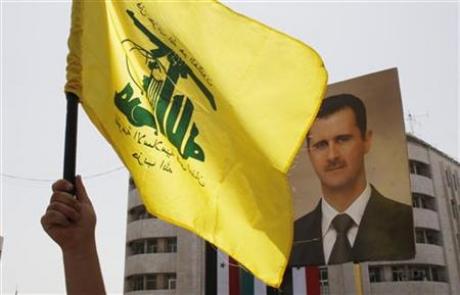By Rita Kairouz, Special to Ya Libnan
 In the wake of neighboring revolution, Hezbollah’s stance in maintaining arms has not shown any abrupt variations. Its defiant pursuit of governance in Lebanon has remained diligent. As the second cedar revolution begins, one must ask a fundamental question, as the new Arab world emerges will Hezbollah remain politically confident?
In the wake of neighboring revolution, Hezbollah’s stance in maintaining arms has not shown any abrupt variations. Its defiant pursuit of governance in Lebanon has remained diligent. As the second cedar revolution begins, one must ask a fundamental question, as the new Arab world emerges will Hezbollah remain politically confident?
In his latest speech, Sayyid Hassan Nasrallah advocated the revolutions in neighboring countries, with specific reference to Bahrain Nasrallah proclaimed, “I ask some in the Arab and Islamic worlds: Why have you remained num over the tyranny against our people in Bahrain, is it only because they are Shiites?”. Nasarllah’s cemented his full support for Shiite revolution but remained silent about the uprisings in Iran and Syria. The question must be asked, what differs the revolution in neighboring countries than those currently occurring in Iran and Syria? They all hold the same belief; the need for decomocracy, freedom of speech and governance without dictatorship. On Thursday the Gulf Cooperation Council (GCC) acknowledged and responded to Nasrallah’s comments by stating “a collective decision to expel all Lebanese Shiites who are connected to Hezbollah and the Iranian Revolutionary Guard,” In times of great discomfort for Arab citizens Nasrallah chose to reinforce his ideology disregarding the placements of Shiites in the gulf. A Bahrain official was quoted in saying, “remarks by Hezbollah chief Hassan Nasrallah had paved the way for the deportation of thousands of Lebanese Shiites from the Gulf.” The comments disfavored Shiites in the gulf and placed a preempted strain on diplomatic ties between Lebanon and Bahrain.
Nasrallah’s strong alliance with Iran and Syria has given his ideology backbone support. On Tuesday, a leading Syrian opposition figure Haitham al-Maleh stated “revolution is at the door”, with multiple deaths due to authoritcal force, protesters are valiantly ignoring their authoritian government. Strong disciplinary actions are being enforced on Syrian reformists. In cities such as Daraa, protesters have responded catalytically defying the fear barrier placed by Assad’s regime. Simultaneously the Iranian opposition is pursuing their desire for change and democracy, displaying their anger and yearning to revolutionize Iranian politics during multiple protests.
Allied support from Syria and Iran may weaken as both countries are being subjected to pressure by reformists. As both nations experience uprisings, the extent of Hezbollah dependence on its loyal allies will begin to strain. Its unwavered alliance is being challenged strongly by activists mounting pressure continues to be sited robustly in Iran and Syria. If activism strengthening in those nations, will the weakening governments of Iran and Syria dismantle Hezbollah’s unwavered allied support?
On the 13th of March, hundreds of thousands of Lebanese gathered to voice their opinions against Hezbollah’s ideology. With loud voices, the Lebanese people cried out for reform against arms held by any militia, directly implicating Hezbollah. With thousands of Lebanese protesting against sectarian influence in politics, public acceptance of Hezbollah’s ideology is on shaking ground.
As the Arab world is getting an encouraging voice from the head of Washington “I am with you”, supporting reform and democratic opinion, will Hezbollah feel alone defending an ideology rejected by the majority of the new Arab world? Hezbollah must re evaluate its politics in Lebanon in the midst of growing revolution. As seen in neighboring countries the choice must be made to coexist with public support or face the inevitable consequences. The Lebanese people are willing to accept different political views and principles but one ideology must govern; the republic of Lebanon will govern itself, without the fear of any militia coup.

Leave a Reply
You must be logged in to post a comment.